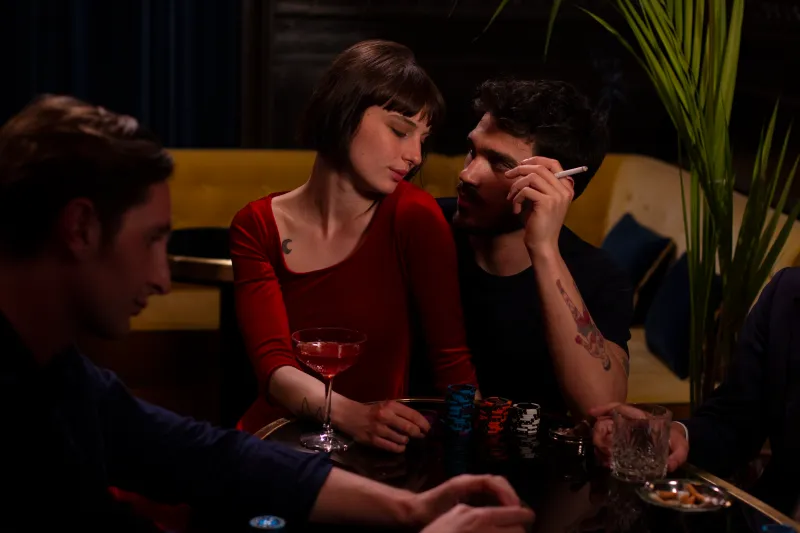The description for the series “Gossip Girl” on Netflix reads “Rich, unreasonably attractive private school students do horrible, scandalous things to each other. Repeatedly.” Netflix could easily use the same statement to sum up its new series “Baby,” which follows the troubled lives of a band of wealthy teenagers at an elite private school in Rome, Italy.
The show focuses on three students: Ludovica, who is poorer than most of her peers and is infamous for participating in a sex tape that was leaked to the whole school; Damiano, the illegitimate child of the Lebanese ambassador to Italy; and Chiara, the main character of the show, who is struggling to find her identity. These character descriptions and the setting of affluence and decadence evince the fact that the show is cut from the same cloth as “Riverdale” or “Pretty Little Liars.” These recent teen dramas combine soapy elements with suspenseful aspects and sleek production. It is also part of Netflix’s swift and dramatic global expansion and — more specifically — of a batch of international teen dramas that include the Spanish “Elite” and the Chinese “Meteor Garden.”
“Baby” is based on the Baby Squillo scandal — in Rome’s affluent Parioli neighborhood around 2014, authorities discovered a teenage prostitution ring. The show does not follow the storyline of the scandal, and perhaps it would have done better to stick to the facts of the shocking and at times poignant case. Instead, they reinvented the story, at times for the worse.
One of the most frustrating parts of the show is how inconsistent it is in terms of quality. An actor that performed well in one part is suddenly histrionic in another. One scene might be shot in a bland, technical way and then be followed by a sequence shot with more creative, exciting cinematography. The show’s fast-paced plot runs up against a wall in the middle of many of the episodes. The producers rely too heavily on montages, cutting between three different characters. The sequences are usually backed by gentle music from the likes of English indie band London Grammar, and feature the characters jogging dramatically, or walking home intensely, or even putting their heads in their hands downcastly. These scenes stifle the momentum that keeps the show going. They are dull and accomplish nothing to push the narrative forward.
“Baby” makes a number of maladroit attempts at infusing the plot with a dash social awareness, perhaps in an effort to convince its teen audience of its being a relevant, important show. Among the subjects it tackles — or rather, just points out — are homophobia, racism, and xenophobia. The treatment of these heavy themes is far from nuanced. The show aims to keep the audience engaged by raising the stakes to impossible heights, and it uses these serious issues to add to the tension and severity of its drama. For instance, the show might have a character who has hated another character for myriad reasons lash out against the other and then paint the attack as racially motivated. This feels nonsensical and out of place, as the character has never referenced the character’s race as one of the many reasons for their animosity until that moment.
While on the one hand “Baby” attempts to shed light, however clumsily, on the societal prejudices lurking in Roman high society, the show simultaneously glorifies the forays into prostitution of two teenage girls. At one bewildering point in the plot, the girls go on a classic, three-bags-on-each-arm shopping spree in the fanciest stores of Rome with the new money they have earned from prostituting themselves. The scene is made even more perplexing by the fact that these girls are from the wealthiest part of Rome and already dress themselves in designer clothing, and so have no need for this new influx of cash. The show presents prostitution as a safe job for high school girls to take up, like working at the local coffee shop or babysitting, but even better because your life is filled with glamorous clothes, slow-motion shots, and shopping montages. Although it does not stay that way forever, the unsettling honeymoon period lasts for several episodes with the girls heading to the nightclub after a stressful day at school to eye potential clients.
At this point, the show might sound like an awful, decadent debacle, and that’s not far from the truth. Yet if someone were to bring up these issues to me, I would probably respond with “But, but, but … ” because I found myself completely hooked, watching the show’s six episodes in such a short span of time that my pride prevents me from writing here just how quickly I consumed it. “Baby” accomplishes what it set out to do (except perhaps for its treatment of social issues), namely, being soapily entertaining. I also found myself invested in most of the characters’ stories, although I often asked myself why, as they are completely bad people, who are often not fleshed out nor portrayed well by their actors.
All this is to say that, in spite of the show’s shortcomings, if the next season were to find me in another vulnerable moment, caught between seasons of my favorite TV shows, I might succumb to its soapy charm once more.
Contact Juan Fueyo-Gomez at jfgomez ‘at’ stanford.edu.
